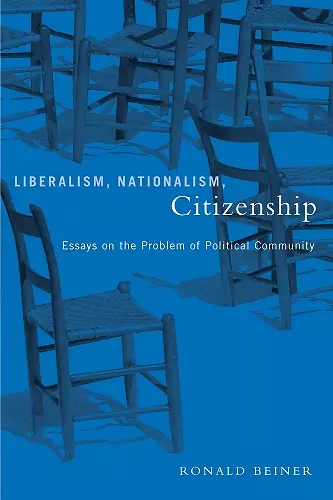Liberalism, Nationalism, Citizenship
Essays on the Problem of Political Community
Format:Paperback
Publisher:University of British Columbia Press
Published:1st Jul '03
Currently unavailable, and unfortunately no date known when it will be back

A brilliant, ambitious rethinking of the nature of political community and the challenges to modern citizenship by one of Canada's foremost political scientists.
Liberals believe that the purpose of politics is to guarantee that individuals do not face unfair impediments in pursuing the lives they choose for themselves. Nationalists believe that the purpose of politics is to ensure that a people’s sense of authentic nationhood wins full expression in powers of collective sovereignty or self-rule. Both of these forms of political commitment yield world-transforming political philosophies, but do either of these visions do adequate justice to a philosophically robust ideal of shared citizenship and civic membership?
In Liberalism, Nationalism, Citizenship, Ronald Beiner engages critically with a wide range of important political thinkers and current debates in light of the Aristotelian idea that shared citizenship is an essential human calling. Virtually every aspect of contemporary political experience – globalization, international migration, secessionist movements, the politics of multiculturalism – pose urgent challenges to modern citizenship. Beiner’s work on the philosophy of citizenship is essential reading not just for students of politics and political philosophy, but for all those who rightly sense that these kinds of recent challenges demand an ambitious rethinking of the nature of political community.
This book is an important addition to the rapidly proliferating literature on questions of citizenship. Ronald Beiner offers a rich normative-philosophical reflection and valorization of the idea of citizenship, specifically to demonstrate that neither liberalism nor nationalism fully honours what he calls the “civic idea.” ... Though the book does not ultimately supply a radical theory of citizenship, it does make a valuable contribution to critiques of liberalism and nationalism as well as theories of citizenship and community. The analysis is contextualized, nuanced well-organized, and showered with lively links between theory and practice. It presents a skilful overview of contemporary debates by addressing some of the most important and difficult questions of citizenship and community, and persuasively resituates the concept of citizenship. It is a useful and relevant book for students of politics and political theory. -- Rita Dhamoon * University of Toronto Quarterly, Winter 2004/05 *
ISBN: 9780774809887
Dimensions: unknown
Weight: 380g
240 pages